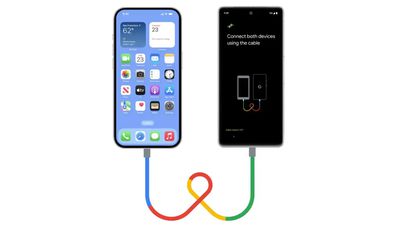Apple to Let EU iPhone Users Delete Safari and More Easily Transition to Android
In addition to adding support for alternative app marketplaces and alternative payment methods in the European Union, Apple is making several other changes to comply with the terms of the Digital Markets Act. Apple today outlined some of its upcoming plans in a DMA Compliance Report [PDF].

Apple is going to make it easier for iPhone users to switch over to another operating system in the European Union. Apple says it is working on a solution that will help mobile operating system providers create "more user-friendly solutions" for transferring data from an iPhone to a non-Apple phone. The solution will be available by fall 2025, after which point companies like Samsung and Google will be able to offer better tools for transferring data from an iPhone.
EU iPhone users will be able to remove Safari from their devices entirely starting at the end of 2024, with an alternate browser able to take the place of Safari. As part of this plan, Apple is developing a browser switching solution for exporting and importing browser data into another browser on the same device. Apple has already began supporting alternative web browser engines, another DMA requirement.
To improve interoperability between iPhone and other smartphone platforms, Apple is allowing third-party payment apps to access the iPhone's NFC chip for contactless payments that are not done through Apple Pay, plus it is allowing developers to submit requests for additional interoperability.
Interoperability requests are evaluated on a case-by-case basis to determine whether they are under the scope of the DMA, and if an effective interoperability solution can be developed.
Developers in the EU are able to request additional mediation that goes beyond the standard App Review Board evaluation. Developers who want to contest unsuccessful appeals to the App Review Board can request mediation, a process that Apple says is "EU-based, easily accessible, impartial, independent, and free-of-charge."
All of these changes are limited to developers and users in the European Union as they are required by the Digital Markets Act.
Popular Stories
Despite being more than two years old, Apple's AirPods Pro 2 still dominate the premium wireless‑earbud space, thanks to a potent mix of top‑tier audio, class‑leading noise cancellation, and Apple's habit of delivering major new features through software updates. With AirPods Pro 3 widely expected to arrive in 2025, prospective buyers now face a familiar dilemma: snap up the proven...
Apple plans to release an all-new super thin iPhone this year, debuting it alongside the iPhone 17, iPhone 17 Pro, and iPhone 17 Pro Max. We've seen pictures of dummy models, cases, and renders with the design, but Lewis Hilsenteger of Unbox Therapy today showed off newer dummy models that give us a better idea of just how thin the "iPhone 17 Air" will be.
The iPhone 17 Air is expected to be ...
If you missed the video showing dummy models of Apple's all-new super thin iPhone 17 Air that's expected later this year, Sonny Dickson this morning shared some further images of the device in close alignment with the other dummy models in the iPhone 17 lineup, indicating just how thin it is likely to be in comparison.
The iPhone 17 Air is expected to be around 5.5mm thick – with a thicker ...
A developer has demonstrated Windows 11 ARM running on an M2 iPad Air using emulation, which has become much easier since the EU's Digital Markets Act (DMA) regulations came into effect.
As spotted by Windows Latest, NTDev shared an instance of the emulation on social media and posted a video on YouTube (embedded below) demonstrating it in action. The achievement relies on new EU regulatory...
Apple's iPhone development roadmap runs several years into the future and the company is continually working with suppliers on several successive iPhone models simultaneously, which is why we often get rumored features months ahead of launch. The iPhone 17 series is no different, and we already have a good idea of what to expect from Apple's 2025 smartphone lineup.
If you skipped the iPhone...
Apple seeded the third beta of iOS 18.5 to developers today, and so far the software update includes only a few minor changes.
The changes are in the Mail and Settings apps.
In the Mail app, you can now easily turn off contact photos directly within the app, by tapping on the circle with three dots in the top-right corner.
In the Settings app, AppleCare+ coverage information is more...
While the iPhone 17 Pro and iPhone 17 Pro Max are not expected to launch until September, there are already plenty of rumors about the devices.
Below, we recap key changes rumored for the iPhone 17 Pro models as of April 2025:
Aluminum frame: iPhone 17 Pro models are rumored to have an aluminum frame, whereas the iPhone 15 Pro and iPhone 16 Pro models have a titanium frame, and the iPhone ...






















